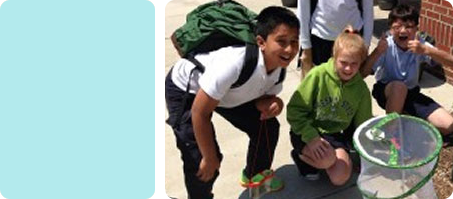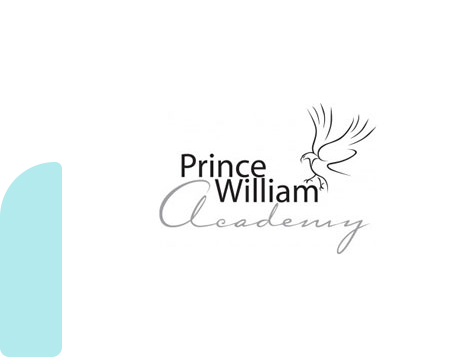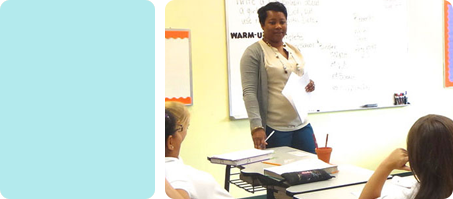Prince William Academy Middle School: A Foundation for Lifelong Success
At Prince William Academy, we understand that middle school is a transformative period in a child’s life. This is when students begin to form their academic identities, discover their passions, and prepare for the challenges and opportunities of high school and beyond.
Our middle school program, serving grades 6 through 8, is designed to nurture and guide students through these critical years. We offer a rigorous, engaging curriculum that encourages intellectual curiosity, creativity, and critical thinking.
One of our key strengths is our small class sizes. With a strict 15:1 student-teacher ratio, each child receives personalized attention and instruction tailored to their individual learning style. This intimate learning environment allows our educators to truly know each student, their strengths and areas for improvement, enabling us to provide targeted support where needed.
At Prince William Academy, we believe that education goes beyond academics. Our middle school program fosters important life skills such as leadership, resilience, adaptability, and empathy. We offer a holistic learning experience that nurtures not only the mind but also the heart.
While we may not have the physical resources of larger schools, we offer a rich, diverse educational experience that challenges and engages students. Our students benefit from an integrated curriculum that includes language arts, mathematics, science, social studies, fine arts, physical education, and world languages, all designed to equip them with the knowledge and skills they need for the future.
Furthermore, our technology integration across subjects ensures our students are well-prepared for a rapidly evolving digital world. We also offer a vibrant music program and a comprehensive physical education program that emphasizes the value of fitness and team sports.
Join us at Prince William Academy, where your child’s journey to lifelong success begins. Our middle school program is more than an education; it’s a launchpad for your child’s future. Welcome to a community that cares, nurtures, and prepares your child for a lifetime of learning and growth. Welcome to Prince William Academy.
Our Middle School Programs

Sixth Grade
In language arts, our sixth grade students utilize McGraw Hill Reading Wonders, through which they experience literature that includes time-honored and contemporary classics, as well as award-winning fiction and non-fiction. The reading selections are organized into powerful learning units focused on important, engaging, and complex concepts that are designed to encourage the students to think, raise questions, and learn.
Sixth grade social studies focus on making a connection between history and geography, and focus on American History from 1865.
Students utilize Glencoe math textbooks throughout middle school. These books demonstrate to students that mathematics will aid them in becoming problem solvers in other areas of life.
Curriculum

Language Arts
In the sixth grade, students are introduced to the formal writing process and the steps involved in preparing and writing research papers. Students also develop summaries, and paraphrase and synthesize information from two or more texts. Sixth grade readers correctly use text features such as captions, charts, diagrams, headings, sub-headings, maps, and graphics and are able to analyze the elements of short stories. These readers continue to gain fluency in a variety of literary genres.
Mathematics
In the sixth grade, the students begin instruction in a middle school environment that allows for peer grouping, small group instruction, and one-on-one support in the classroom. Students actively engage in the problem solving process and apply their math skills to solve word problems. The students build on basic math skills solving process and apply their math skills to solve word problems. The students build on basic math skills and develop more advanced knowledge of concepts including rational numbers, whole numbers, integers, fractions, and decimals. Students also work with proportional reasoning and problem solving, and use concrete, pictorial, and abstract representations as a part of learning math.
Science
Our middle schoolers study science through the Glencoe Integrated Science framework, which reveals how the science disciplines are interrelated and integrated throughout the texts. These texts provide opportunities for students to learn reasoning skills and a new way of thinking about their environment. to study the Earth and space, energy sources, the Sun, the Earth’s atmosphere and surface, atomic properties and matter, uses of water, air properties, watershed systems, and environmental public policy. On a weekly basis, sixth grade students conduct experiments in the science lab. Each sixth grader must plan, conduct, and present a science fair project. Through increasingly hands-on, inquiry-based lessons, students sharpen their research skills and problem-solving techniques.
Social Studies
United States History: 1865 to the Present
Sixth grade students continue to explore the historical, geographical, political, and social contexts that shaped the United States, from the Reconstruction era to the present. Students learn about the Civil War, the industrial revolution, World War I, World War II, and the economic and social impact of the Great Depression. Students also study how the United States responded to the Civil Rights Movement, the Vietnam War, and other major challenges and movements of the 21st century.
Fine Arts
Students learn and employ effective planning methods for compositions using thumbnail sketches and clear project proposals. Bookmaking techniques are covered, and students make their own sketchbooks to maintain throughout the year. Students also study the history of art from different cultures of the world.
Technology
Students conduct research using various types of text- and media-based resources. They also can demonstrate how to cite digital resources when developing nonfiction reports and presentations. Our middle school students utilize laptops in class, and have regular access to our computer lab.
Music
Middle school students demonstrate appropriate choral behaviors. The students sing melodies written in traditional notation on the treble staff, in unison, or in two parts. At this level, students are exposed to a variety of musical styles and musical works from different periods of music history, and continue to develop an understanding of the relationship of music to history, culture, technology, and other fields of knowledge. Students gain a cultural perspective of music and the value of music in society.
Physical Education
Our middle school students also continue to develop strength, endurance and flexibility by participating in a wide variety of individual and team-based activities. They also learn about the importance of developing good health habits, and of regular exercise. They participate in team sports, including soccer and basketball.
World Languages Program
Students enhance their listening comprehension, and engage in expressing their own thoughts through dialogue. They also read paragraphs describing simple objects, and write basic sentences. Students engage in oral presentations to demonstrate knowledge of subject-verb agreement, infinitive verbs, and definite and indefinite articles. They enhance their conversational language skills via computer technology, and are introduced to cultural dances. Students learn about various cultures, traditions, and holidays.
Language teachers engage their students in singing songs that develop a child’s musical talent and ear for correct pronunciation and intonation. Three times a year, students participate in special performances for their parents during the Winter Program, Mother’s Day program, and an end-of-the-year program.

Seventh Grade
Mathematics objectives progress in complexity at 7th & 8th grade level and throughout the middle school courses. Students in the middle grades use problem solving, mathematical communication, mathematical reasoning, connections, and representations to integrate understanding within all the strands. We focus on inculcating in our students the deep mathematical understandings required for success in abstract learning experiences, and teach them to apply mathematics as a tool in solving real-life problems. In doing so, we provide Prince William Academy students with some of the tools they’ll need to shape their futures.
In language arts, the students utilize StudySync to add complexity to the act of reading. The students are required to go through a highly interactive process that requires them to rapidly, fluently, and automatically process print, and then bring their own experiences and knowledge of the world to bear in deriving meaning from the text. The reading curriculum focuses on word analysis and vocabulary development, as well as comprehension and independent interpretation. The selected materials include fiction, nonfiction, poetry, drama, myths, legends, folktales, electronic media, songs, comic strips, and comedy scripts.
The students will also use various supplementary texts to help them hone expository skills in writing.
Our science curriculum utilizes the Glencoe Integrated Science framework. Grade 7 focuses on Life and Earth science.
Middle School Grade Seven Curriculum

Language Arts
Seventh graders are able to develop a research paper with a clear introduction, thesis statement, supporting details, and conclusion. They also write in different forms, including exposition, narration, and persuasion. In reading, seventh graders are able to identify and analyze character, setting, plot, and themes such as alliteration, dialogue, and figurative language. At this level, students are responsible for daily journal writing.
Mathematics
The seventh grade math program builds upon skills learned in the sixth grade to strengthen knowledge in preparation for algebra and more advanced geometry. Students learn to simplify algebraic equations, and are introduced to linear equations and the Pythagorean Theorem. Seventh graders learn to apply basic concepts of geometry, including calculating the surface area of three-dimensional figures, probability and statistics, and algebraic reasoning and functioning. Students also work in depth at solving two-step equations, graphing linear equations, identifying three-dimensional shapes, and using transformations. The students also build skills in math using the ALEKS online learning program.
Science
Our seventh grade curriculum is a laboratory and activity-centered program that provides students with a broad foundation through the biological sciences using a hybrid curriculum. The curriculum provides an introduction to life science and the characteristics of living things, classification of organisms, plant and animal cell structure, the characteristics of unicellular and multi-cellular life, genetics, the structure and function of human cell tissues and organ systems, and the structure and function of plants. Students are required to present a complete science fair project, which includes a lab journal, research paper with cited works, and an organized, neat display. During science lab, students participate in whole group exercises as well as individual or pair and share exploratory learning activities.
Social Studies
Civics and Economics
Seventh grade students examine the roles citizens play in the political, governmental, and economic systems in the United States.
Fine Arts
Seventh grade students complete projects with a demonstrated mastery of the elements of design and a focus on artistic style. They also study ethnographic art, as well as the old masters and their impact on art movements throughout history.
Technology
Students learn about how various careers incorporate technology. They continue to utilize their computers for most school-related tasks, and use new tools in various content areas, including math and science. They also learn and demonstrate the ability to create PowerPoint presentations.
Music
Middle school students demonstrate appropriate choral behaviors. The students sing melodies written in traditional notation on the treble staff, in unison, or in two parts. At this level, students are exposed to a variety of musical styles and musical works from different periods of music history, and continue to develop an understanding of the relationship of music to history, culture, technology, and other fields of knowledge.Students gain a cultural perspective of music and the value of music in society.
Physical Education
Students continue to develop strength, endurance and flexibility by participating in a wide variety of individual and team-based activities. They also learn about the importance of developing good health habits, and of regular exercise. They participate in team sports, including soccer and basketball.
World Languages Program
At this stage, students engage in oral presentations to demonstrate knowledge of subject-verb agreement, infinitive verbs, and definite and indefinite articles. They engage in more complex dialogue, and are introduced to cultural dances, traditions, and holidays.
Language teachers engage their students in singing songs that develop a child’s musical talent and ear for correct pronunciation and intonation. Three times a year, students participate in special performances for their parents during the Winter Program, Mother’s Day program, and an end-of-the-year program.

Eighth Grade
Mathematics objectives progress in complexity at 7th & 8th grade level and throughout the middle school courses. Students in the middle grades use problem solving, mathematical communication, mathematical reasoning, connections, and representations to integrate understanding within all the strands. We focus on inculcating in our students the deep mathematical understandings required for success in abstract learning experiences, and teach them to apply mathematics as a tool in solving real-life problems. In doing so, we provide Prince William Academy students with some of the tools they’ll need to shape their futures.
In language arts, students continue to learn through StudySync and various supplemental sources to hone writing skills. The students are required to go through a highly interactive process that requires them to rapidly, fluently, and automatically process print, and then bring their own experiences and knowledge of the world to bear in deriving meaning from the text. The reading curriculum focuses on word analysis and vocabulary development, as well as comprehension and independent interpretation. The selected materials include fiction, nonfiction, poetry, drama, myths, legends, folktales, electronic media, songs, comic strips, and comedy scripts.
Our middle schoolers study science through the Glencoe Integrated Science framework, which reveals how the science disciplines are interrelated and integrated throughout the texts. These texts provide opportunities for students to learn reasoning skills and a new way of thinking about their environment. to study the Earth and space, energy sources, the Sun, the Earth’s atmosphere and surface, atomic properties and matter, uses of water, air properties, watershed systems, and environmental public policy. On a weekly basis, sixth grade students conduct experiments in the science lab. Each sixth grader must plan, conduct, and present a science fair project. Through increasingly hands-on, inquiry-based lessons, students sharpen their research skills and problem-solving techniques.
Middle School Curriculum Grade Eight Overview

Language Arts
Eighth graders are able to compare and contrast story elements and parts of speech. Reading as an eighth grader involves exploring literary and expository texts, and students participate in novel studies and examine various forms of poetry. Eighth graders can select and use appropriate resources such as almanacs, glossaries, thesauruses, and encyclopedias.
Mathematics
Eighth grade students continue to expand their knowledge of the mathematical concepts of algebraic reasoning and functioning. Students continue and expand on mathematical skills that include simplifying and solving algebraic equations, as well as solving one and two-step linear equations. The students also further their understanding of basic geometry concepts, including calculating the surface area of three-dimensional figures. The students also build skills in math using the ALEKS online learning program.
Science
The eighth grade uses a hybrid curriculum to study physical science. Laboratory investigations and activities are used as the means for developing problem-solving skills to apply to scientific principles studied. Themes covered consist of organization and use of the periodic table, physical and chemical changes, nuclear reactions, temperature and heat, sound, light, electricity and magnetism, and workforce and motion. Students must also create, plan, and present a science fair project with a research paper, poster display, and laboratory notebook. All students complete science fair projects and participate in the school-wide science fair.
Social Studies
World History and Geography to 1500 c.e.
Eighth grade students explore the historical development of people, places, and patterns of life from ancient times until 1500 C.E., including Western and non-Western Civilizations.
Fine Arts
In eighth grade, students learn with an emphasis on life drawing. Students work on self-portraits in an artistic style of the old masters. The philosophy of aesthetics is addressed (what is art?) and modern art such as Dada, Surrealism, and Kinetic art is reviewed. Students also explore non-traditional mediums, and work towards a large-format project.
Technology
Students continue to utilize technology to develop written and media-based reports and projects. By eighth grade, students are very proficient at keyboarding, and can unhesitatingly perform word processing tasks and Internet-based research.
Music
Middle school students demonstrate appropriate choral behaviors. The students sing melodies written in traditional notation on the treble staff, in unison, or in two parts. At this level, students are exposed to a variety of musical styles and musical works from different periods of music history, and continue to develop an understanding of the relationship of music to history, culture, technology, and other fields of knowledge. Students gain a cultural perspective of music and the value of music in society.
Physical Education
Our middle school students continue to develop strength, endurance and flexibility by participating in a wide variety of individual and team-based activities. They also learn about the importance of developing good health habits, and of regular exercise. They participate in team sports, including soccer and basketball.
World Languages Program
Students work towards conversation and proper grammar. They are introduced to past tense, indirect and direct object pronouns, and reflexive verbs. Students continue to add to their knowledge of cultures, traditions, and holidays. Eighth graders use proper grammar and language patterns when completing writing assignments. They also continue to learn literacy and history through presentations.







